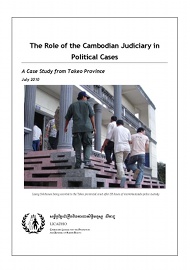The Role of the Cambodian Judiciary in Political Cases
Released in September 2010
| Download this briefing in English (PDF, 200.91 KBs) | |
| Download this briefing in Khmer (PDF, 204.41 KBs) |
On Saturday, May 29, 2010, at 6:15 a.m., Mr. Leang Sokchouen, an employee of LICADHO, was arrested at his home in Phnom Penh’s Sen Sok district by police officers from the Internal Security Department of the Ministry of Interior. Subsequent to his arrest, Mr. Sokchouen was transferred to the Headquarters of the National Police Commissioner in Phnom Penh, where he was held incommunicado for more than 33 hours, despite repeated requests by family and his lawyer to be able to access him.
Cambodia is State party to the International Covenant on Civil and Political Rights (ICCPR). Article 9 (1) of the ICCPR reads as follows:
"Everyone has the right to liberty and security of person. No one shall be subjected to arbitrary arrest or detention. No one shall be deprived of his liberty except on such grounds and in accordance with such procedure as established by law."
The Human Rights Committee, the treaty body which is tasked with monitoring the State parties'' performance under the ICCPR, has stated that deprivations of liberty must in all cases be carried out in accordance with domestic legislation (principle of legality). More importantly, the Committee has held that deprivations of liberty must not be arbitrary, clarifying that "arbitrariness is not to be equated with against the law, but must be interpreted more broadly to include elements of inappropriateness, injustice, lack of predictability and due process of law."
Leang Sokchouen's arrest and remand in custody by the Cambodian judiciary bears all the hallmarks of inappropriateness, injustice, lack of predictability and due process outlined by the Human Rights Committee. These violations are characteristic of political systems that fail to genuinely implement basic principles of the rule of law.
- Topics
- Judiciary/Rule of Law







